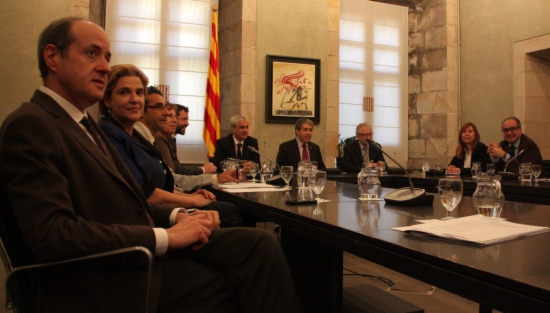15.07.2014 - 12:25
Once the referendum or plebiscite is held with a result that favors independence, the National Transition Advisory Council (Consell Assessor per la Transició Nacional, CATN) foresees the possibility of a unilateral declaration of independence, in the event that the Spanish Government refuses to negotiate the secession and the conditions for separation. The government advisors explain the details in one of the new reports issued Monday, in which they also indicate that once independence is declared, Catalonia will have to have a provisional constitution and there may be a time in which both the Catalan and Spanish jurisprudence coexist side by side.
CATN’s president, Carles Viver i Pi Sunyer explained that the process will have two phases.
First phase: Scenario with collaboration with the Spanish State
In this phase, the Catalan Government will have to take four kinds of actions: Negotiate with the Spanish State on those measures that facilitate the construction of a new state, begin the negotiations and contacts with the international community in order to achieve international recognition, initiate contacts with the EU and international organisms in order to prepare the integration of the new state both within the EU and with other international organisms, and finally, prepare the creation of the new state by building those state structures and institutions that will exercise the powers of the new state in the territory of Catalonia, and to prepare the regulations that will be applied when the constituent process begins.
In a scenario of collaboration with the Spanish State, it would be good, according to the CATN, to agree on flexibilizing the legal jurisdictions, because some of the things that the Generalitat will have to do are beyond its current recognized jurisdiction. With these conditions established, in a period of time—that Scotland set at eighteen months—the moment will come when independence is declared, in order to disconnect Catalonia from the Spanish legal system and begin the constituent process itself.
And if there is no collaboration from the State?
In a scenario in which there is no collaboration, it is more difficult to complete the process, from negotiations with the international community to establishing jurisdictions and state structures. Without the collaboration of the State, it all becomes more complicated. Everything will depend on the level of non-collaboration, that is, if it’s passive or more belligerent. If it is belligerent, there will have to be international mediation, says the CATN, and also the support of a mobilized civil society at that moment.
The proper moment for the unilateral proclamation
If the State rejects the request to open negotiations, there will have to be a unilateral proclamation of independence, which would culminate the separation with the state legal system and which would begin a new constituent process. In this case, the independence proclamation would have the problem, according to Pi Sunyer, of whether the new Catalan state’s institutions would be mature enough to exercise their power in the territory. And he emphasizes that they would have to find a moment of equilibrium, by making the declaration at the moment in which they were capable of carrying out all of the functions required in the state. And during a period of time, the two legal systems, the Spanish and the Catalan, might coexist. Having declared independence does not necessarily mean that Catalonia wouldn’t continue to ask for negotiations with the Spanish State. Finally, the CATN insists on the necessity of ratifying the proclamation of independence in a referendum.
Second Phase: Constituent Process
This phase begins after independence is proclaimed. The new state would have to take three actions. It would have to create a provisional law, a provisional constitution, like the one that South Africa made, so that in the period in which there was no definitively approved constitution, all the procedures that a state should have would be present, including the process of creating a constitution. The provisional constitution would then have to define who were the citizens of the new state, the rights and obligations of the citizens, fundamental governmental institutions, the relationship with the Spanish State and with other states, incorporation of international law with Catalan law, linguistic policy, legal succession, how the transition from Spanish to Catalan law will work… And finally, elections will have to be called for the Constituent Parliament.
Then, a new constitution will have to be written, once the constituent process is concluded.




